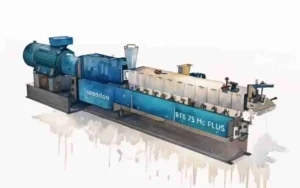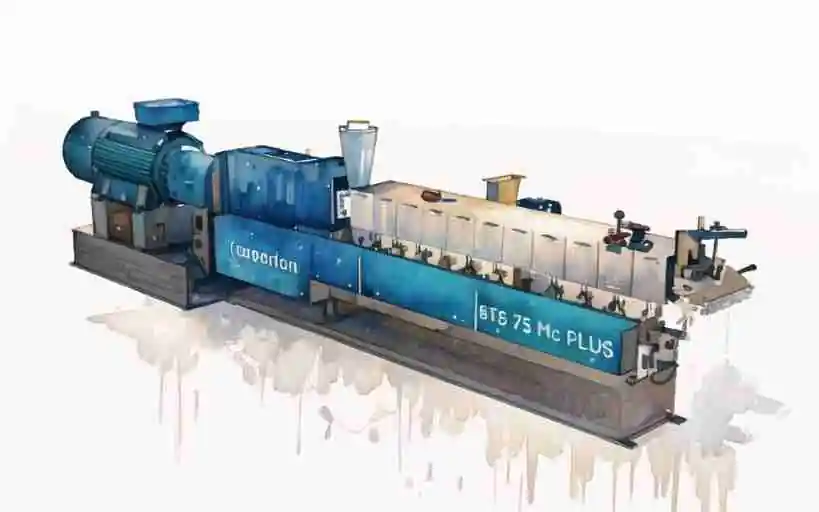A Technical Review of Herbold Meckesheim Recycling Technology: Applicability for Organic Waste Depackaging and Separation
Herbold Meckesheim Recycling Technology is an industry leader in advanced machinery for the recycling sector, with an emphasis on plastic recycling, grinding, shredding, and washing systems. Known for their robust and durable equipment, Herbold Meckesheim’s technology is primarily designed to handle post-industrial and post-consumer plastics rather than organic waste.
However, in certain applications, Herbold’s equipment has found use in processing waste streams that may include organic materials, such as mixed packaging or municipal solid waste (MSW) containing food residues and other biodegradable components.
This article provides a comprehensive analysis of the strengths and weaknesses of Herbold Meckesheim Recycling Technology in handling organic waste depackaging and separation. It reviews the main products offered, their suitability for organic waste, and includes case studies where applicable.
Note: This article is based upon our review of the Herbold website. Before taking any action on this article readers should check carefully this manufacturer’s website, in order to confirm our opinion.
Overview of Herbold Meckesheim Recycling Technology
Herbold Meckesheim’s machinery is designed for size reduction, separation, and cleaning of plastic materials. The main product categories include:
- Granulators and Shredders: For size reduction of plastics and other solid materials.
- Plastic Washers and Friction Washers: Designed to clean and decontaminate recycled plastics.
- Separation and Float-Sink Tanks: Used to separate contaminants from valuable plastic fractions.
- Drying and Dewatering Units: For removing moisture from recycled materials.
Each of these products is specialized for plastic recycling applications. While Herbold equipment can assist in the preliminary stages of organic waste depackaging—particularly when dealing with mixed plastic and residual waste containing some organic waste—its suitability for pure organic processing appear to be limited. The equipment’s focus remains on handling non-biodegradable, solid materials rather than separating and processing organic, biodegradable fractions.
Key Herbold Meckesheim Recycling Products and Their Relevance to Organic Waste Processing
1. Herbold Meckesheim Recycling Granulators and Shredders
- Functionality: Herbold’s granulators and shredders are primarily designed to reduce the size of plastics. These machines can handle high-throughput processing, breaking down items like bottles, films, and rigid plastics into smaller particles for further recycling.
- Applicability for Organic Waste: While these machines can handle mixed waste streams that include plastic and organic materials, they are not ideal for pure organic waste processing. Shredders, in particular, are generally discouraged in organic waste processing due to the formation of microplastics when plastic and organic materials are shredded together. This can lead to contamination issues in composting or anaerobic digestion if the organics are not separated from plastics beforehand.
2. Herbold Meckesheim Recycling Plastic Washers and Friction Washers
- Functionality: Herbold Meckesheim offers a range of washing systems designed to remove contaminants from recycled plastic materials. Friction washers, for instance, use centrifugal force to clean and separate lighter contaminants.
- Applicability for Organic Waste: These washers can clean residues off plastic surfaces, but they are not tailored for depackaging or separating organic material from mixed waste. For example, if a waste stream includes food residues and plastics, these washers might help to remove some surface residues but are not designed for in-depth organic separation. Additionally, washing systems typically require significant water usage, which may increase operational costs and complicate organic waste processing due to additional wastewater handling.
3. Herbold Meckesheim Recycling Separation Units (Float-Sink Tanks)
- Functionality: Herbold’s separation units, such as float-sink tanks, are used to divide plastic types based on their densities. Lightweight plastics float while denser particles, such as contaminants, sink.
- Applicability for Organic Waste: Float-sink tanks are primarily beneficial in separating different plastics or contaminants in recycling operations. However, they are not optimal for depackaging organic materials since organic waste can vary in density and moisture content, leading to inefficiencies. Additionally, organic materials that are wet or sticky can clog or disrupt the separation process.
4. Herbold Meckesheim Recycling Drying and Dewatering Systems
- Functionality: Herbold’s drying and dewatering units are designed to remove water from plastic particles after washing, using methods such as centrifugation.
- Applicability for Organic Waste: Dewatering can be useful when handling mixed waste that contains moisture-rich components, but Herbold’s dewatering systems are specific to non-biodegradable particles. When applied to organic materials, there may be issues with clogging or inefficiency due to the softer, variable nature of organic waste.
Strengths of Herbold Meckesheim Recycling Technology in Organic Waste Context
1. High-Performance Shredding and Size Reduction for Mixed Waste
Herbold’s shredders are built for robust processing, making them capable of handling mixed waste streams that contain both plastic and organic matter. For instance, in settings where municipal solid waste or food-packaging waste is processed, the shredders can break down mixed materials effectively. However, these shredders should be used cautiously in applications where minimal contamination of organics is required, as they may contribute to microplastic contamination if used with plastic-heavy streams.
2. Effective Contaminant Removal from Plastic Surfaces
For mixed waste streams where the focus is on recovering clean plastic, Herbold’s washing and friction washing systems are beneficial for removing food residues and other contaminants from the surface of plastic items. This capability is useful in depackaging scenarios where food-contact packaging needs to be recycled without leaving organic residues.
3. Durability and Low Maintenance
Herbold’s equipment is built to handle abrasive, high-impact applications, making it a low-maintenance solution for facilities that need reliable operation over extended periods. For waste streams with mixed durability requirements, such as industrial packaging, Herbold’s machinery can maintain consistent performance without frequent repairs or downtime.
Weaknesses of Herbold Meckesheim Recycling Technology in Organic Waste Context
1. Not Designed for Pure Organic Separation
Herbold’s technology is explicitly developed for plastic recycling and lacks specialized features for organic waste separation. The absence of a gentle separation mechanism that could isolate organic materials from packaging without shredding or grinding makes it unsuitable for organic depackaging where purity is essential. Organic waste depackaging often requires minimal contamination to ensure that the organic output is suitable for composting or anaerobic digestion, which Herbold’s shredders and granulators do not provide.
2. Potential for Microplastic Contamination
Shredding and grinding organic and plastic waste together can result in the formation of microplastics, an environmental concern, especially in organic waste streams destined for composting. Facilities looking to maintain high-quality organic output would need additional separation stages to minimize microplastic contamination, adding to operational complexity.
3. Limited Efficiency in High-Moisture Organic Streams
Although Herbold’s washers and friction washers are efficient in cleaning plastics, they may struggle with organic-rich, moisture-heavy waste streams. Organic waste is often wet and sticky, which can lead to inefficiencies or clogging within systems designed for drier, more solid materials. Additionally, the equipment’s water-intensive washing process may be less environmentally friendly in organic waste processing due to increased wastewater management needs.
4. No Dedicated Depackaging Capabilities
Unlike dedicated depackaging systems that use non-destructive, gentle separation, Herbold’s equipment does not have the capability to separate packaging from organic content without substantially damaging either component. This limitation is significant for applications focused on maintaining high purity in the organic fraction, especially in sectors like food waste processing where contamination could affect end-product quality.
Case Studies and Real-World Applications
There are few documented case studies on the use of Herbold Meckesheim technology specifically for organic waste processing due to its specialization in plastic recycling. However, some facilities have adapted Herbold’s systems for processing mixed waste streams that include organic residues.
1. Plastic Recycling Plant in Germany
A recycling plant in Germany uses Herbold’s shredders and washers to process mixed household packaging waste. While primarily focused on plastic recovery, the plant encountered challenges in separating food residues from the plastic, especially when dealing with high-moisture items. The plant noted that while the washers effectively removed surface residues, complete organic separation was not possible, highlighting limitations in handling organic materials alongside plastic.
2. Mixed Municipal Waste Processing in France
A French municipal waste facility experimented with Herbold’s shredders for pre-processing mixed municipal waste containing food packaging. Although the shredders were effective in reducing the size of mixed materials, they generated plastic fragments that contaminated the organic fraction, complicating further separation steps. The facility ultimately concluded that Herbold’s technology was best suited to pre-processing stages rather than final organic separation.
Comparison with Alternative Organic Waste Processing Technologies

Compared to specialized depackaging machines and non-shredding separators designed for organic waste, Herbold’s equipment lacks the delicate handling and separation capabilities that minimize contamination in organic output. For facilities prioritizing high-purity organic recovery, alternative equipment with non-shredding designs and low-destructive separation mechanisms are typically more suitable than shredders or friction washers. Herbold’s technology, on the other hand, remains ideal for settings where organic contamination is low and plastic recovery is the main goal.
Conclusion
Herbold Meckesheim Recycling Technology offers a range of high-performance equipment tailored to plastic recycling, excelling in durability, contaminant removal from plastics, and low maintenance needs. However, its application in organic waste depackaging and separation is limited, as it lacks the gentle handling and specialized design needed to maintain high-purity organic output.
Manufacturer of recycling and processing equipment
Industry Sector: Recycling Technology
Business Location: Baden-Württemberg Germany
Address:
Industriestraße 33,
74909 Meckesheim,
Germany
Phone: +4962269320
Website:
Herbold: https://www.herbold.com/en/
Opening Hours:
8am to 5pm Weekdays

